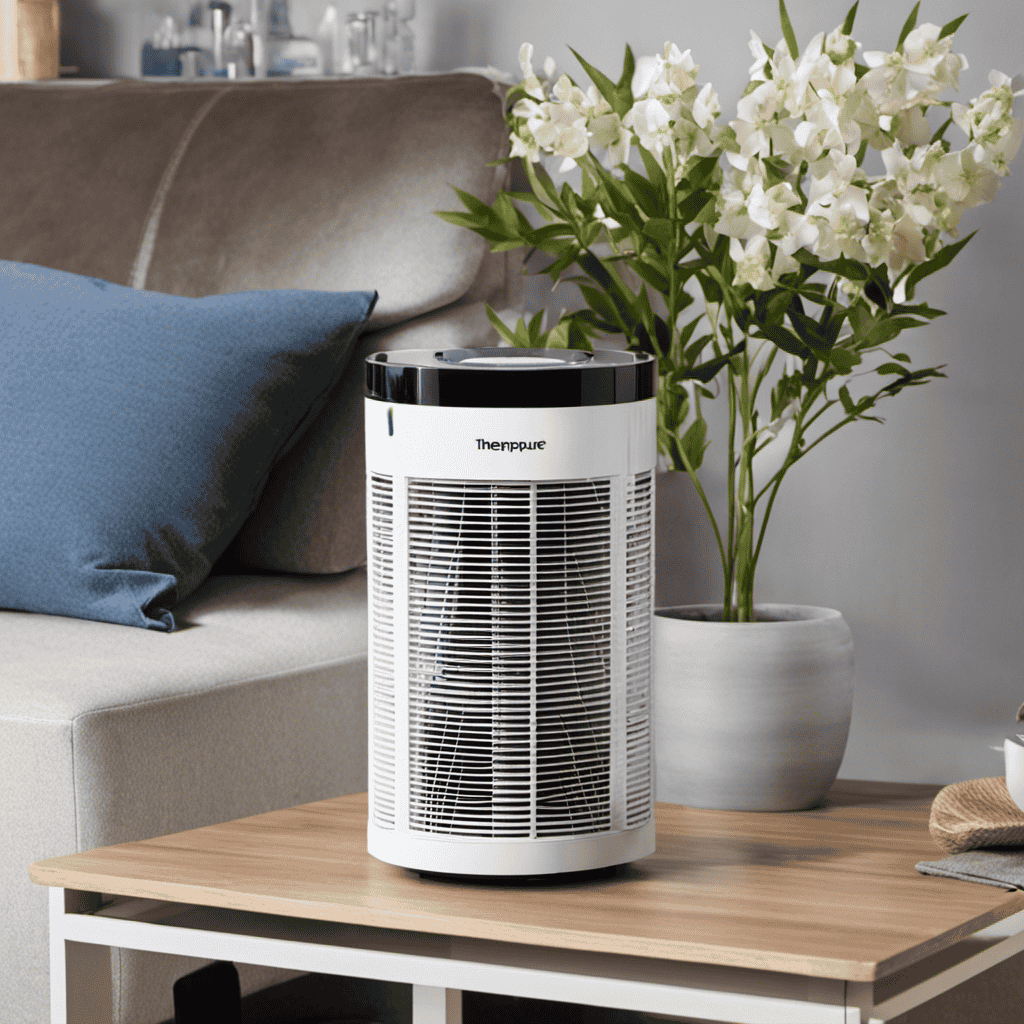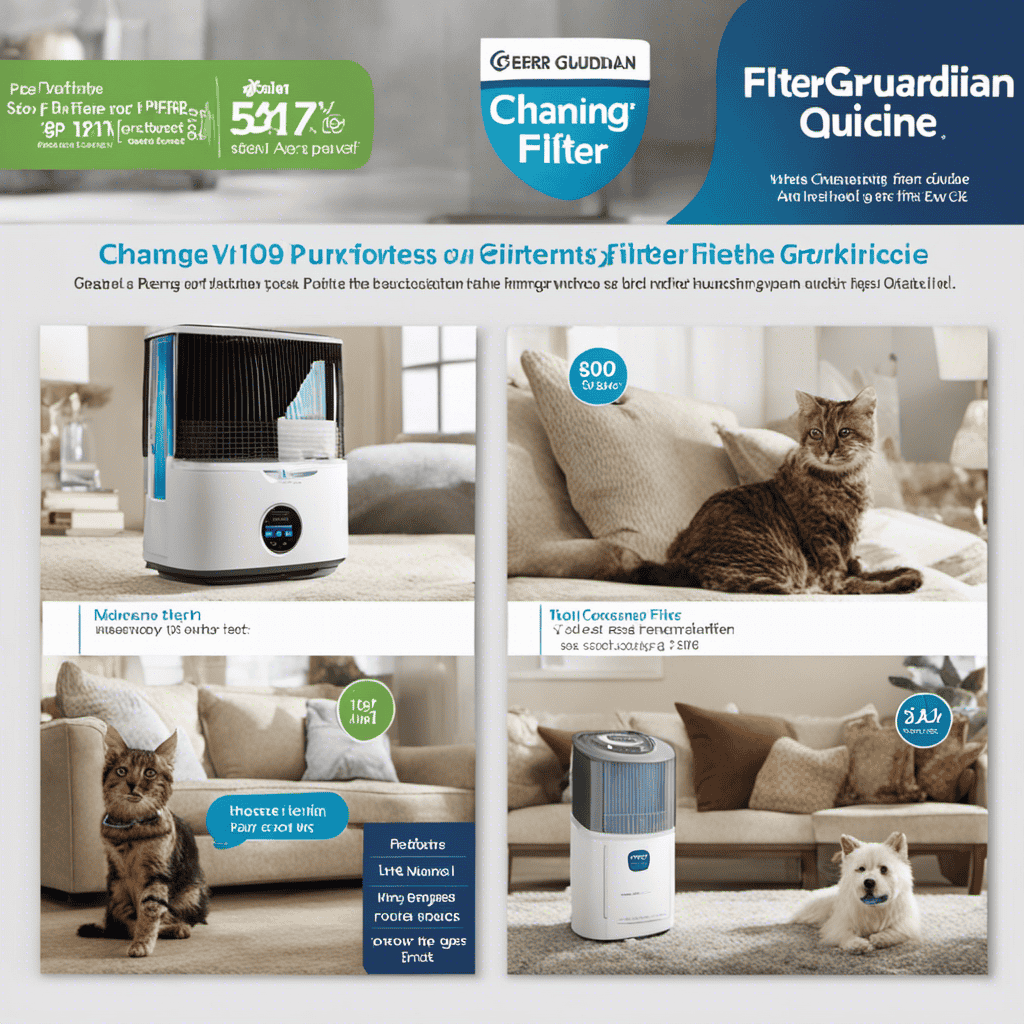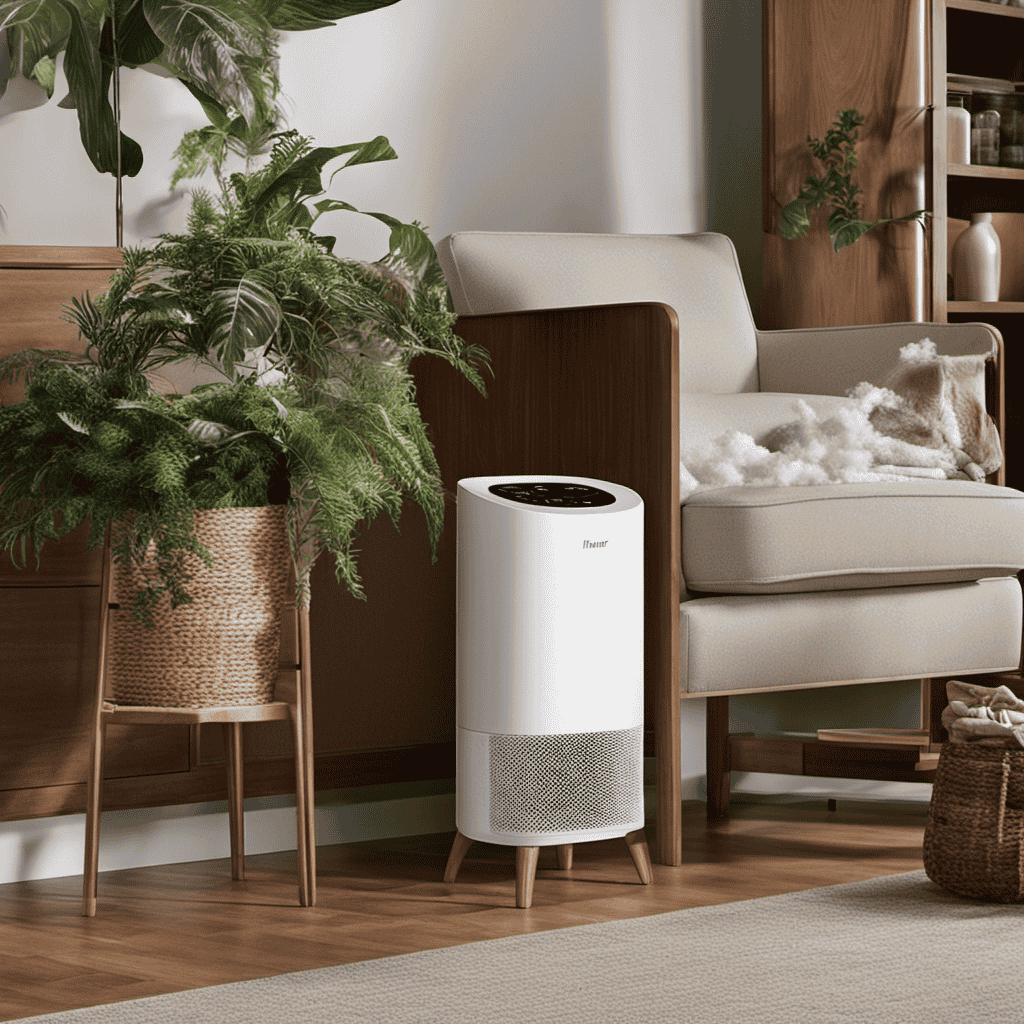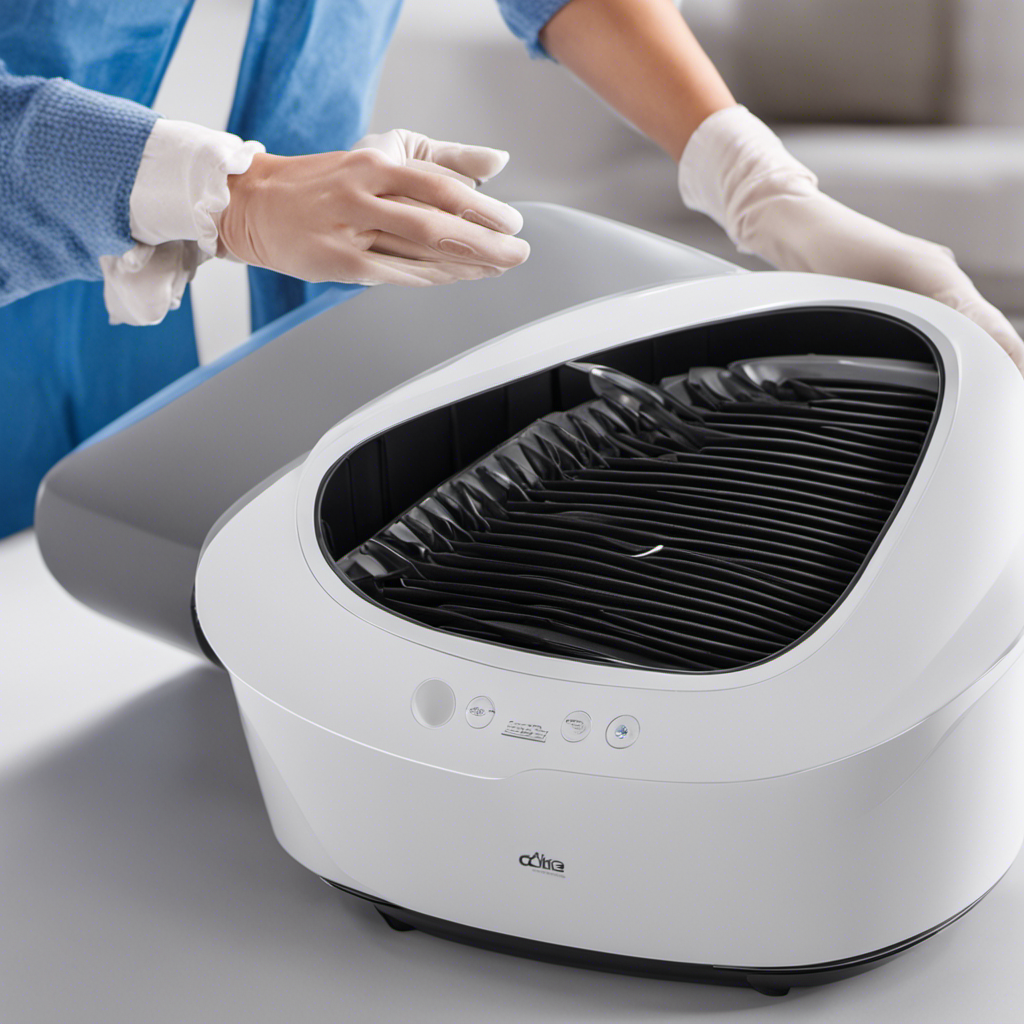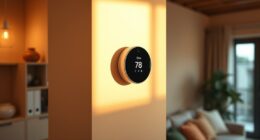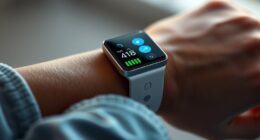I’ve frequently questioned, which air purifier is capable of efficiently removing N95 particles?
In this article, we will explore the key features to look for in an air purifier specifically designed for N95 particle removal.
We’ll dive into the effectiveness of HEPA filters, evaluate air purifiers based on CADR ratings and particle size efficiency, and discuss the potential of ionic air purifiers and UV-C light technology.
By the end, you’ll have a thorough understanding of which air purifier is the right choice for eliminating N95 particles.
Key Takeaways
- Air purifiers with HEPA filters are effective at removing N95 particles.
- HEPA filters can capture particles as small as 0.3 microns.
- Choosing an air purifier with a high CADR ensures efficient removal of N95 particles.
- Ionic air purifiers may be effective at removing particles, including N95 particles, but more research is needed to fully understand their effectiveness.
Understanding N95 Particles and Air Purification
Understanding how N95 particles can be cleaned by an air purifier is essential for choosing the right one. N95 particles are tiny airborne particles that can pose serious health risks when inhaled. These particles can come from various sources, including air pollution, allergens, and respiratory droplets.
The impact of air pollution on respiratory health is well-documented, with studies showing a link between exposure to pollutants and the development of respiratory diseases. An air purifier equipped with a HEPA filter is effective at removing N95 particles from the air. HEPA filters are designed to capture particles as small as 0.3 microns, ensuring the removal of N95 particles.
It is important to choose an air purifier with a high CADR (clean air delivery rate) to ensure efficient removal of these harmful particles and maintain a healthy indoor environment.
Key Features to Look for in an Air Purifier for N95 Particle Removal
When looking for an air purifier that effectively removes N95 particles, you should consider key features such as HEPA filtration and activated carbon technology. These features are essential in capturing and eliminating tiny particles, including viruses and bacteria, ensuring the air you breathe is clean and safe.
Here are four important features to look for in an air purifier for N95 particle removal:
-
HEPA Filtration: Look for air purifiers that have a true HEPA filter, capable of trapping particles as small as 0.3 microns with a high efficiency rate of 99.97%.
-
Activated Carbon Technology: Air purifiers with activated carbon filters can effectively eliminate odors, gases, and volatile organic compounds (VOCs) from the air, providing an added layer of purification.
-
Air Change Rate: Consider the air purifier’s air change rate, which indicates how many times it can clean the room’s air in an hour. Higher air change rates mean more frequent purification.
-
Noise Level: Check the noise level of the air purifier, especially if you plan to use it in a bedroom or office. Look for quieter models that won’t disturb your sleep or work.
When considering air purifier brands and cost considerations, it’s essential to balance performance and affordability. Compare different models, read customer reviews, and choose a reputable brand that offers a good warranty and reliable customer support. Remember, investing in a high-quality air purifier is an investment in your health and well-being.
HEPA Filters: The Gold Standard for N95 Particle Capture
HEPA filters are considered the gold standard for capturing tiny particles, including N95 particles. These filters are made of densely packed fibers that can trap particles as small as 0.3 microns with an efficiency of 99.97%.
They work by using a combination of three mechanisms: interception, impaction, and diffusion. Interception occurs when particles collide with the filter fibers and get trapped. Impaction happens when larger particles cannot maneuver through the fibers and are captured. Diffusion comes into play for the smallest particles, which are constantly bombarded by air molecules and eventually get captured.
In comparison, activated carbon filters are more effective at removing odors and gases, but they are not as efficient at capturing tiny particles.
To maintain the effectiveness of HEPA filters, regular maintenance is crucial. This includes replacing filters as recommended by the manufacturer and keeping the air purifier clean.
Transitioning into the next section, evaluating air purifiers, CADR ratings and particle size efficiency will help determine the overall performance of the device.
Evaluating Air Purifiers: CADR Ratings and Particle Size Efficiency
When evaluating air purifiers, it’s essential to consider two key points: CADR ratings and particle size efficiency.
CADR ratings, or Clean Air Delivery Rate, provide an indication of how effectively an air purifier can remove pollutants from the air.
Understanding the importance of particle size efficiency is crucial because different air purifiers may have varying capabilities in capturing particles of different sizes.
CADR Ratings Explained
To understand CADR ratings, you can look at how effectively an air purifier removes particles from the air. Here are four key points to help you understand CADR ratings and how they affect air purifier performance:
-
CADR stands for Clean Air Delivery Rate and is a standardized measurement of an air purifier’s efficiency in removing particles of specific sizes from the air.
-
CADR ratings are determined by independent testing laboratories and are based on the air purifier’s ability to remove smoke, dust, and pollen particles from the air.
-
The higher the CADR rating, the more effective the air purifier is in removing particles from the air. A higher CADR rating means the air purifier can clean the air in a room faster and more efficiently.
-
When choosing an air purifier, it is important to consider the CADR rating for your specific needs. If you have allergies or live in a highly polluted area, a higher CADR rating may be more beneficial for you.
Understanding CADR ratings is essential in selecting an air purifier that will effectively improve your indoor air quality. By considering the CADR rating, you can ensure that you choose an air purifier that will efficiently remove particles from the air and provide you with clean and fresh air to breathe.
Particle Size Efficiency Importance
Understanding the importance of particle size efficiency is crucial for ensuring that your air purifier effectively removes harmful substances from your indoor environment. When it comes to air purifiers, the size of particles that can be captured plays a significant role in their effectiveness. Different pollutants have different particle sizes, and an air purifier must be able to capture particles of various sizes to provide clean and healthy air. Here is a table that demonstrates the particle size efficiency of different types of air purifiers:
| Air Purifier Type | Particle Size Efficiency |
|---|---|
| HEPA | 0.3 microns and above |
| Activated Carbon | 0.01 microns and above |
| Ultraviolet (UV) | 0.1 microns and above |
| Electrostatic | 0.1 microns and above |
As you can see, each type of air purifier has its own specific range of particle sizes that it can effectively capture. Therefore, it is important to consider the particle size efficiency of an air purifier before making a purchase decision. By doing so, you can ensure that you are investing in an air purifier that can effectively remove harmful substances from your indoor environment.
Ionic Air Purifiers: Can They Effectively Clean N95 Particles
When it comes to air purifiers, there are two main types of filters to consider: ionic filters and HEPA filters.
Both have their pros and cons when it comes to removing N95 particles from the air.
In this discussion, I will explore the efficacy of ionizers in effectively cleaning N95 particles and compare them to the performance of HEPA filters.
Ionic Vs HEPA Filters
If you’re trying to decide between ionic and HEPA filters for an air purifier, you should consider their effectiveness in cleaning N95 particles. Here is a comparison of the pros and cons of ionic filters and HEPA filters:
-
Ionic filters:
- Pros: Ionic filters are effective at removing smaller particles from the air, including smoke and mold spores. They are also generally more affordable than HEPA filters.
- Cons: Ionic filters produce ozone as a byproduct, which can be harmful to human health. They may also have limited effectiveness in capturing larger particles like dust and pollen.
-
HEPA filters:
- Pros: HEPA filters are highly effective at capturing particles as small as 0.3 microns, including N95 particles. They can remove dust, pollen, pet dander, and other allergens from the air.
- Cons: HEPA filters can be more expensive than ionic filters. They also require regular replacement to maintain their effectiveness.
Overall, if you prioritize effectiveness and safety, HEPA filters are a better choice for cleaning N95 particles.
N95 Particle Removal
HEPA filters are highly effective at capturing particles as small as 0.3 microns, including N95 particles. When it comes to N95 particle filtration, air purifiers play a crucial role in maintaining clean and healthy indoor air.
N95 particles are tiny and can pose a significant health risk if inhaled. Therefore, having an air purifier that can effectively filter out these particles is essential. HEPA filters are designed to trap particles of various sizes, and their efficiency in capturing N95 particles has been extensively tested and proven.
Studies have shown that HEPA filters can remove up to 99.97% of particles as small as 0.3 microns, which includes N95 particles. Therefore, investing in an air purifier with a HEPA filter can greatly enhance the air quality in your home or office, ensuring the removal of harmful N95 particles and promoting a healthier environment.
Efficacy of Ionizers?
To effectively improve indoor air quality, consider using an ionizer as it can help remove harmful particles. Here are four reasons why ionizers are an effective choice for air purification:
-
Ionizers use negative ions to attach to and neutralize airborne pollutants such as dust, pollen, and pet dander. This helps to reduce the number of particles in the air, making it cleaner and healthier to breathe.
-
Unlike ozone generators, which can produce harmful ozone gas, ionizers do not generate ozone as a byproduct. This makes them a safer option for those concerned about ozone exposure.
-
Ionizers are often equipped with activated carbon filters, which are highly effective at trapping and removing odors, chemicals, and volatile organic compounds (VOCs) from the air. This helps to eliminate unpleasant smells and improve overall air quality.
-
Ionizers are typically low-maintenance and energy-efficient, making them a cost-effective solution for long-term use.
UV-C Light Technology: An Effective Solution for N95 Particle Elimination
UV-C light technology is an effective solution for eliminating N95 particles. The use of UV-C light in air purification systems has been proven to be highly beneficial.
UV-C light, specifically in the wavelength range of 200-280 nanometers, has the ability to destroy the genetic material of microorganisms, including viruses and bacteria. This technology works by damaging the DNA and RNA structure of these particles, rendering them unable to replicate and causing their ultimate destruction.
The benefits of UV-C light in air purification are numerous. Firstly, it is a chemical-free method, making it safe for both humans and the environment. Additionally, it is highly efficient in eliminating a wide range of pathogens, including those that are resistant to other forms of disinfection.
Furthermore, UV-C light technology is easy to implement and maintain, making it a cost-effective solution for N95 particle elimination.
Choosing the Right Air Purifier for N95 Particle Removal: Considerations and Recommendations
When considering an air filtration system for N95 particle removal, you should take into account factors such as room size, noise level, and maintenance requirements. Here are four key considerations to help you choose the right air purifier:
-
Room size: Consider the square footage of the room where you plan to use the air purifier. Different models have varying coverage capacities, so make sure to choose one that is suitable for your room size.
-
Noise level: Some air purifiers can be quite noisy, especially at higher fan speeds. If noise is a concern for you, look for models that offer quiet operation or have a noise reduction feature.
-
Maintenance requirements: Air purifiers require regular filter replacements to maintain optimal performance. Consider the cost and availability of replacement filters for the brand and model you are interested in.
-
Cost considerations: Air purifiers come in a range of prices, and the cost can vary depending on the brand, features, and filtration technology. Set a budget and compare prices to find a model that meets your needs without breaking the bank.
Frequently Asked Questions
Can an Air Purifier Completely Eliminate N95 Particles From the Air?
Yes, an air purifier can completely eliminate N95 particles from the air. Air purifiers with carbon filters are particularly effective in capturing N95 particles and ensuring clean air.
Do All Air Purifiers With HEPA Filters Capture N95 Particles?
No, not all air purifiers with HEPA filters capture N95 particles. Air purifiers without HEPA filters do not remove N95 particles. There are no alternatives to air purifiers for removing N95 particles.
Are Ionic Air Purifiers as Effective as HEPA Filters in Removing N95 Particles?
Ionic air purifiers have both pros and cons compared to HEPA filters. While they may remove some particles, they are less effective at capturing N95 particles. When it comes to general air purification, HEPA filters are more reliable.
How Does UV-C Light Technology Compare to HEPA Filters in Eliminating N95 Particles?
How does UV-C light technology compare to HEPA filters in eliminating N95 particles? Is it as effective as HEPA in removing these particles? Let’s explore the effectiveness of UV-C and HEPA in eliminating N95 particles.
Are There Any Specific Air Purifier Brands or Models That Are Recommended for the Removal of N95 Particles?
When looking for the best air purifier brands, it’s important to consider features that can effectively remove N95 particles. Some models are designed specifically for this purpose, offering advanced filtration and purification technologies.
Conclusion
In conclusion, after thorough research and evaluation, it is clear that HEPA filters are the gold standard when it comes to air purifiers for N95 particle removal. These filters have proven their efficiency in capturing and eliminating N95 particles effectively.
However, it is important to consider other factors such as CADR ratings and UV-C light technology for a comprehensive solution.
With the right air purifier, we can confidently breathe cleaner, safer air, knowing that N95 particles are being effectively eliminated.
So let’s choose wisely and prioritize our health and well-being.

